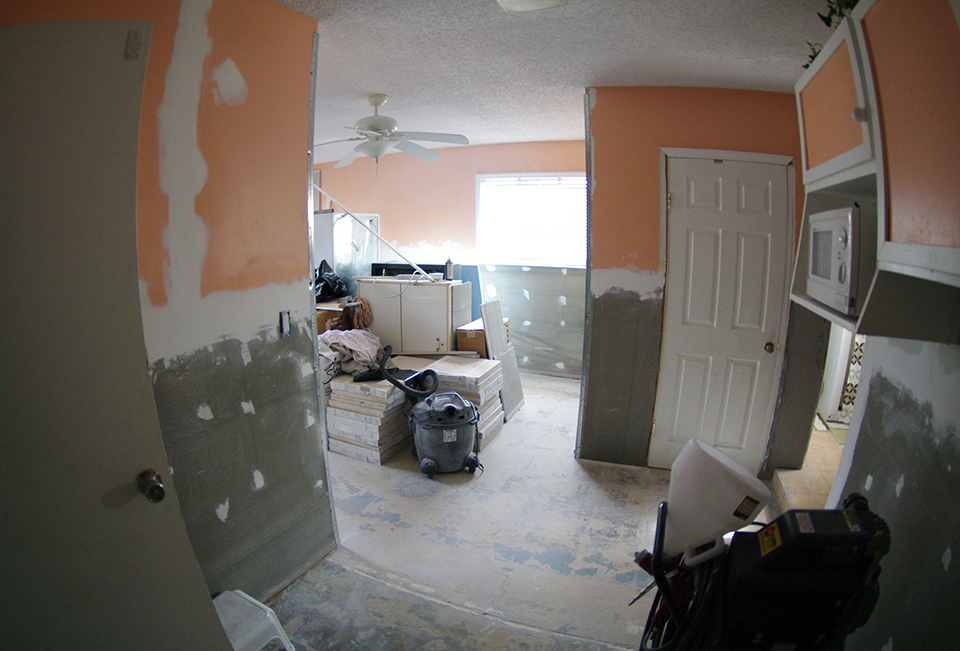
Work is nearing completion on the Sebring, Fla., home of Nirmala Narayan. Hers was the first case opened by the Florida Conference’s case managers in Central Florida. Photo by Gustavo Vasquez, UMNS.
Story by Joey Butler
Feb. 27, 2018 | NAPLES, Florida (UMNS)
As a case manager with the Florida Conference’s Disaster Response team, Aileen Castro spends her days helping others. A few months ago, she was the one needing help.
Castro and her family were out of town when Hurricane Irma struck. They returned to find two to three feet of water in their house, their cars flooded and ruined and personal documents swept away. They had nowhere else to go, so they slept in the house for two weeks until someone secured them a hotel room.
“We were renters, and our landlord decided not to do repairs and kicked us out. Finding housing was difficult,” she said. “Now I relate to my clients who struggle to find housing. I’ve been on the other side of the table.”
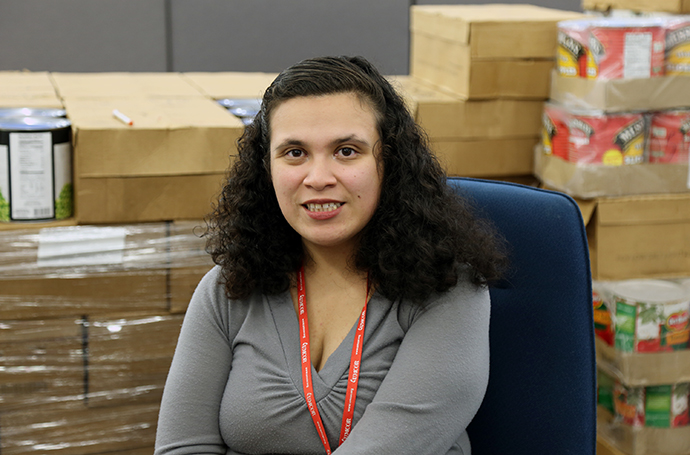
Aileen Castro is case manager with the Florida Conference’s Disaster Response team in Naples, Fla. Castro took the job as a way to give back after her family was helped to recover after Hurricane Irma flooded their house and cars. Photo by Gustavo Vasquez, UMNS.
When Castro saw the opening for case manager advertised, she realized her experience dealing with relief agencies and red tape was an opportunity to give back.
“It helps clients get more comfortable with me because they know I relate to their situation; they trust me a little more.”
Castro is one of an army of both paid staff and volunteers at many levels of The United Methodist Church committed to helping those affected by disaster worldwide.
That help can run the gamut from providing material needs to advocating or helping with paperwork, to just offering a hug.
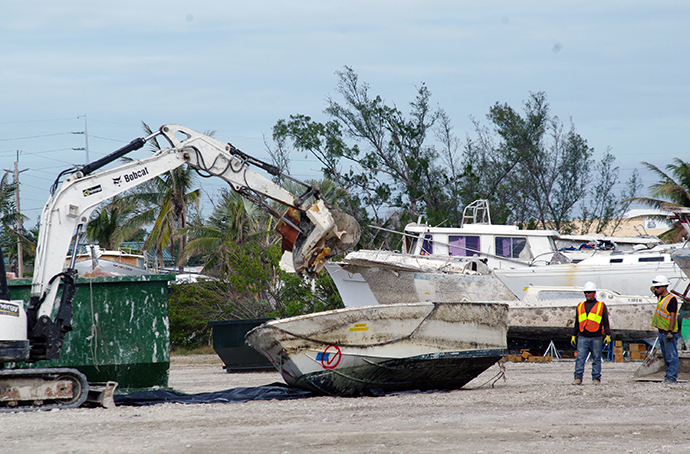
A closed golf course in Marathon Key, Fla., has become a makeshift site where boats that were unmoored and damaged by Hurricane Irma are demolished. Photo by Joey Butler, UMNS.
The Rev. Laura Ice, recovery coordinator for the Florida Conference, said emotional support can’t be overlooked, as many struggle to process their experiences.
“One lady I work with was struggling emotionally and didn’t know what was wrong,” Ice said. “She said, ‘You know, I’ve never even cried.’ I told her, ‘You probably need to cry.’”
WANT TO HELP?
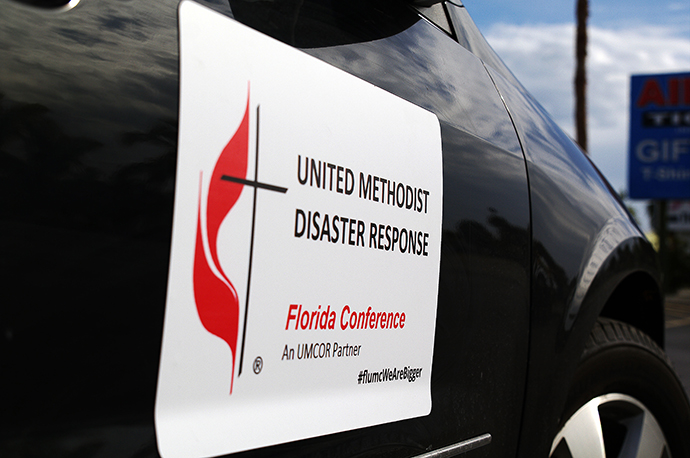
Celebrate UMCOR Sunday in your church on March 11.
Donate directly to UMCOR’s US Disaster Response, Advance #901670.
Contribute money or volunteer through the Florida Conference’s #WeAreBigger campaign.
Phillip Decker, Florida Conference regional team leader for Monroe County, which includes The Keys, estimates the recovery effort will take three to four years.
“There’s no lack of work down here. The impression is given that we’re fully recovered and open for business. Many of the tourist areas are recovered but there are thousands of homeowners affected and in need of support,” he said.
Decker is continuing to look for ways to help the large number of residents who live on houseboats. Boats aren’t considered permanent residence so they don’t qualify for government assistance.
While conference staff are trained to spring into action when a disaster strikes, others step up when the opportunity to help arises.
“We were a church that God was preparing for a hurricane so that when it came, we were ready,” said the Rev. David Juliano, pastor of Sebring First United Methodist.
When Irma hit, 85 percent of Highlands County was left without power.
“By the second day,” Juliano said, “my wife turned to me and said, ‘We need to get up to the church, check on our neighbors and start helping the folks who are worse off than we are.’”
The church didn’t have power, but it did have a gas stove and a big kitchen. They made spaghetti and delivered boxed meals to the community. Word spread, leading to volunteers and donations. The church served 8,000 meals the first week following the storm.
As power began to be restored, the need for a hot meal diminished, so they became a relief center. “We didn’t have any expertise, but we were being attentive to the Holy Spirit,” Juliano said.
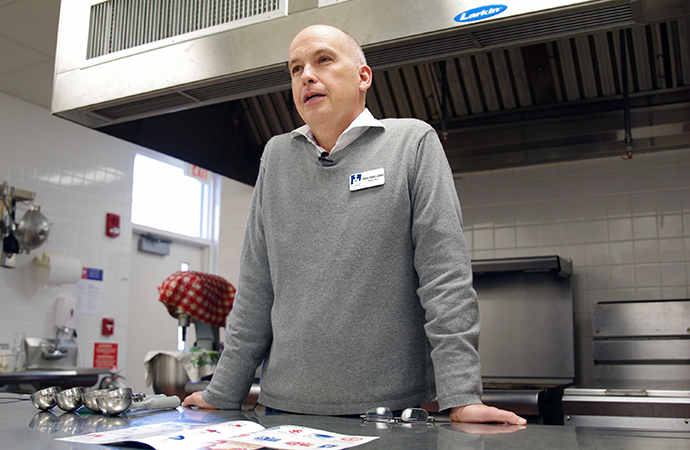
The Rev. David Juliano, pastor of Sebring First United Methodist Church, led an effort to deliver hot meals to the neighboring community after Irma knocked out power in most of the Sebring, Fla., area. The church served 8,000 meals the first week following the storm. Photo by Gustavo Vasquez, UMNS.
At Riverside Camp and Retreat Center in LaBelle, a ministry of the Florida Conference, the storm knocked down 100 trees, damaged 28 buildings and disrupted power for 12 days. Once the trees were cleared and power restored, the Rev. David Weber Jr., camp director, felt called to offer “extreme Christian hospitality” by rearranging the lodging schedule to house volunteers and missionaries.
Now, most of Riverside’s RV parking is taken up by a mix of traveling mission teams, residents in Federal Emergency Management Agency trailers and NOMADS — a ministry of the United Methodist Board of Global Ministries geared toward RV owners seeking service opportunities.
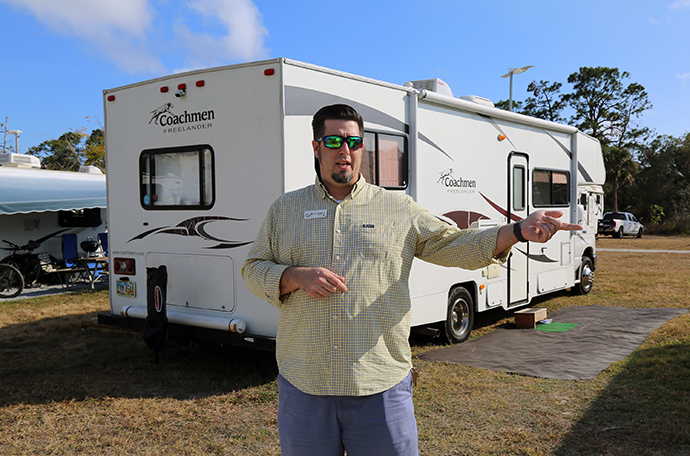
The Rev. David Weber Jr., director of the Riverside Camp and Retreat Center in LaBelle, Fla., said he felt called to offer “extreme Christian hospitality” by rearranging the lodging schedule to house volunteers and missionaries. Photo by Gustavo Vasquez, UMNS.
Debbie Ford, a NOMAD and “full-time RVer,” was with a crew repairing the roof of Matecumbe United Methodist Church in Islamorada. She estimates she and her husband have worked on 60 NOMAD projects since they joined in 2000.
“I hope we give back as much as we’re given, because we get so much,” she said. “We’ll do it until we can’t lift a paintbrush.”
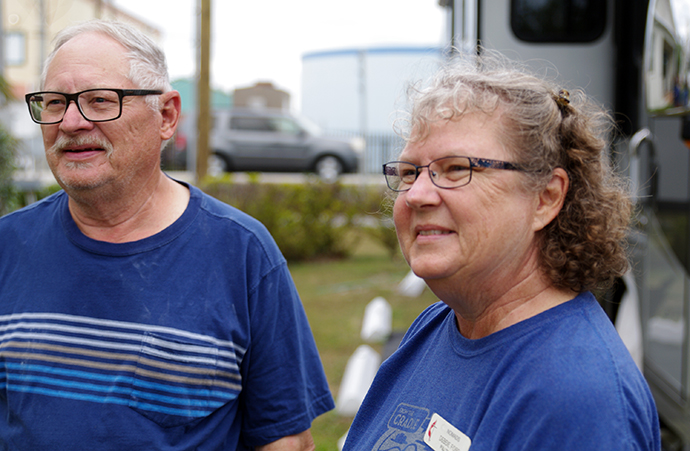
Mark and Debbie Ford are “full-time RVers” who travel on mission work trips with NOMADS, a ministry of the United Methodist Board of Global Ministries geared toward RV owners seeking service opportunities. They were doing repairs to Matecumbe United Methodist Church in Islamorada, Fla. Photo by Gustavo Vasquez, UMNS.
Case manager Kathy Curtis came out of retirement when she found out about the opening for her current position.
“My heart has never been in a job like it is with this one; it’s a calling. I love bringing comfort and encouragement to people,” she said.
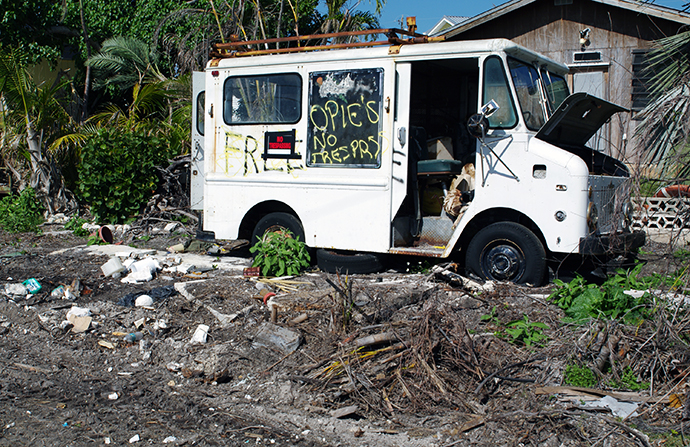
A heavily damaged service truck sits in the yard of an abandoned home in Big Pine Key, Fla. Photo by Gustavo Vasquez, UMNS.
Curtis works out of an office at Wesley United Methodist on Marco Island. The Rev. Kirk Dreisler, Wesley’s pastor, said he never fully embraced how long the recovery process takes.
“It’s not over when you take one offering and send some money somewhere. I understand now why UMCOR is a constant, ongoing ministry,” he said.
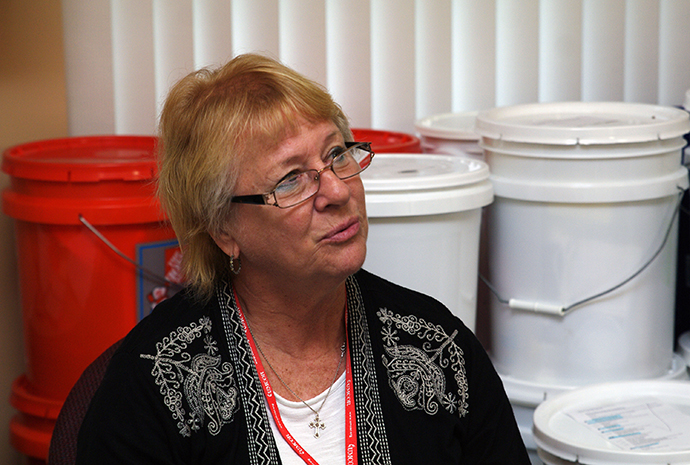
Kathy Curtis, a Florida Conference case manager based in Marco Island, Fla., came out of retirement to accept her position. “My heart has never been in a job like it is with this one; it’s a calling,” she said. Photo by Gustavo Vasquez, UMNS.
Pam Garrison, disaster response coordinator for the Florida Conference, said the main needs are for monetary donations and volunteers. The conference will need more teams beginning in August and September.
One of the biggest challenges is housing, whether it’s finding temporary lodging or getting homes repaired or rebuilt. Curtis said she’s always seeking skilled volunteers because professional contractors stay busy with paid projects.
Read more, watch video
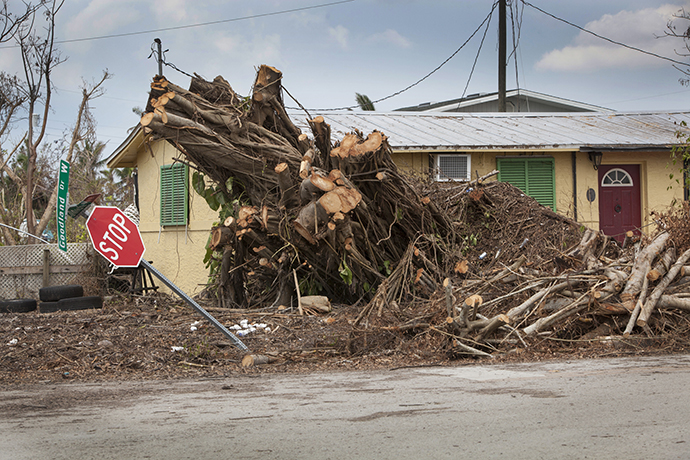
The news crews are long gone, but The United Methodist Church is still helping Floridians recover from the historic storm.
Read the first story in our report, Irma survivors grateful for church's help.
Watch video on Florida recovery work.
In Naples, Castro said roof repair and moldy drywall removal are vital needs. Just like her family, she added, many of her clients have nowhere else to go and are sleeping under those conditions.
Of particular concern to Castro is Florida’s undocumented migrant worker community.
“If they don’t have documentation or can’t report income because they get paid in cash, that excludes them from a lot of programs, so we look to church organizations,” she explained.
The Rev. Luz Maldonado, pastor of Iglesia Metodista Unida Nuevo Pacto in Sebring, is concerned about the growing number of Puerto Ricans entering the area after Hurricane Maria struck there Sept. 20 — as well as those still living on the island, much of which is still without power.
Maldonado, a Puerto Rican native, said her church has so far taken in five families who evacuated.
“We are trying to help them make a life here. They came with a suitcase and no job. We are trying to provide them with information on where to rent, how to enroll children in school, and translators for non-English speakers.”
Maldonado said times of greatest need are an opportunity for the church to minister to others.
“After the news forgets about what’s happening, there’s still need. The church becomes a family for the ones who feel alone.”
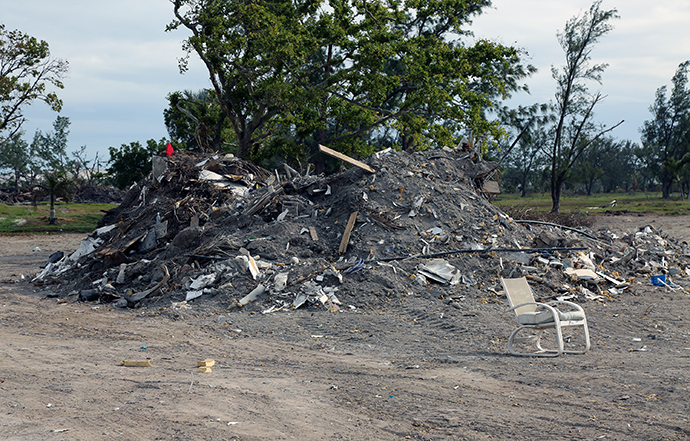
Debris from Hurricane Irma sits in massive piles on an abandoned golf course in Marathon, Fla. Photo by Deborah Coble, Florida Conference.
Butler is multimedia editor for United Methodist News Service. The Rev. Gustavo Vasquez, Hispanic News Desk director for United Methodist News Service, and the Rev. Deborah Coble, a communications consultant to the Florida Conference, contributed to this report. News media contact: Vicki Brown, Nashville, Tenn., (615) 742-5470 or newsdesk@umcom.org. To read more United Methodist news, subscribe to the free Daily or Weekly Digests.
Like what you're reading? Support the ministry of UM News! Your support ensures the latest denominational news, dynamic stories and informative articles will continue to connect our global community. Make a tax-deductible donation at ResourceUMC.org/GiveUMCom.



